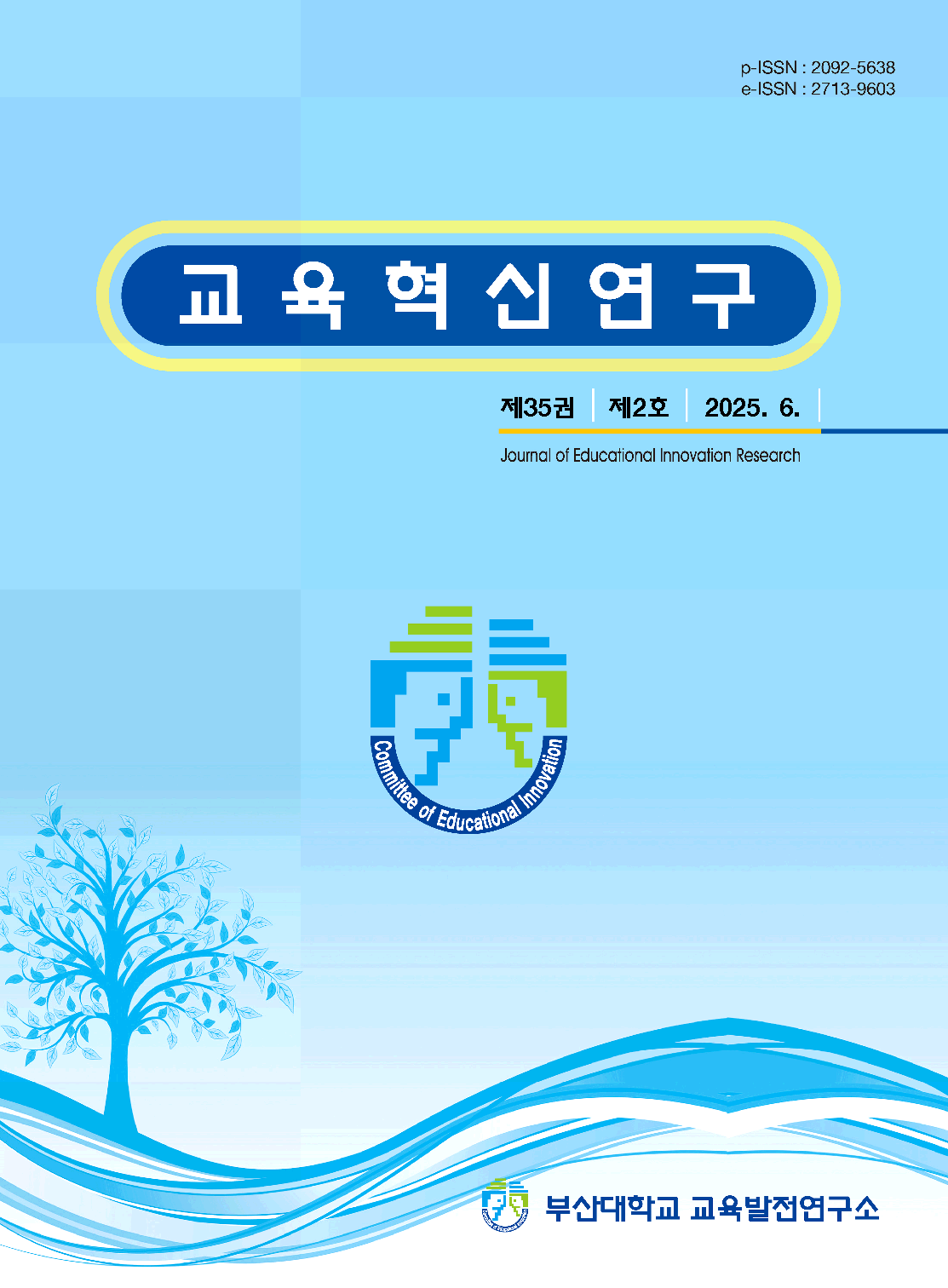학술논문
수업 구성 분석을 위한 GPT 개발
이용수 63
- 영문명
- Development of GPT for Instructional Structure Analysis
- 발행기관
- 부산대학교 교육발전연구소
- 저자명
- 이상수
- 간행물 정보
- 『교육혁신연구』제35권 제2호, 69~88쪽, 전체 20쪽
- 주제분류
- 사회과학 > 교육학
- 파일형태
- 발행일자
- 2025.06.30
5,200원
구매일시로부터 72시간 이내에 다운로드 가능합니다.
이 학술논문 정보는 (주)교보문고와 각 발행기관 사이에 저작물 이용 계약이 체결된 것으로, 교보문고를 통해 제공되고 있습니다.

국문 초록
연구목적: 본 연구는 Gagné의 9가지 수업사태 이론에 기반하여 대학 강의의 구성 요소를 자동으로 분석할 수 있는 GPT 기반 수업 분석 도구를 개발하고, 해당 도구의 정확성과 신뢰성을 검토하는 데 목적이 있다. 기존 수업컨설팅의 주관성과 효율성 문제를 보완하기 위해, 인공지능 기술을 활용한 수업 분석 자동화 방안을 모색하였다.
연구방법: 본 연구는 개발연구 방법론을 활용하여 문헌 분석, 도구 설계, 타당화 및 수정의 단계로 연구를 수행하였다. 수업 구성 분석 기준은 도입, 전개, 정리의 3단계로 구성하였으며, ChatGPT Builder를 이용해 맞춤형 GPT를 설계하였다. 도구의 타당화는 교육공학회 공인 수업컨설팅 전문가가 분석한 결과와 GPT의 분석 결과를 비교하는 방식으로 이루어졌으며, 분석 지표는 정확성, 전문성, 구체성, GPT의 한계로 설정되었다.
연구결과: 분석 결과 GPT와 인간 전문가 간의 전체 일치도는 Cohen의 Kappa 계수 0.84로 매우 높은 수준으로 나타났다. GPT는 다양한 전공 수업에서 전문성과 일관성을 기반으로 수업 내용을 정확하게 분석하였으며, 텍스트 기반 정보 분석에 강점을 보였다. 반면, 비언어적 요소(표정, 몸짓), 시각 자료(슬라이드, 판서 등)와 같은 멀티모달 정보에 대한 분석에는 한계가 존재하였다.
논의 및 결론: 본 연구는 수업 구성 분석의 객관화와 자동화 가능성을 입증하였다는 점에서 의의가 있다. 특히 GPT 도구는 교과 전문성과 교육학적 원리를 접목하여 풍부한 분석과 피드백을 제공할 수 있어, 수업컨설팅의 신뢰도와 효율성을 향상시킬 수 있는 대안을 제시하였다. 향후 연구에서는 영상, 음성 등 멀티모달 데이터를 통합 분석할 수 있는 차세대 GPT 도구 개발을 통해 분석의 깊이와 교육적 활용성을 확대할 필요가 있다. 이 연구는 GPT 기반 도구가 교수자의 수업 전문성 향상과 질적 개선에 실질적으로 기여할 수 있음을 보여준다.
영문 초록
Purpose: This study aims to develop a GPT-based automated instructional analysis tool that analyzes the structure of university lectures based on Gagné’s Nine Events of Instruction. The study seeks to address the limitations of traditional instructional consulting, including subjectivity and inefficiency, by proposing an AI-powered alternative for analyzing and improving instructional design.
Method: A design-based research methodology was employed, consisting of three phases: literature review, tool development, and validation. The instructional structure was categorized into three stages—introduction, development, and conclusion—with detailed criteria for each. The customized GPT was developed using ChatGPT Builder. To validate the tool, the analysis results generated by the GPT were compared with those of certified instructional experts, with a focuse on accuracy, domain expertise, specificity, and the limitations.
Results: There were high agreement between GPT and human experts, with a Cohen’s Kappa coefficient of .84. The GPT demonstrated high accuracy and consistency in analyzing instructional content across diverse subject areas. It was particularly effective in processing and interpreting text-based lecture transcripts. However, limitations were found in analying multimodal information, such as non-verbal communication (e.g., gestures, facial expressions) and visual materials (e.g., slides, boardwork).
Conclusion: This study contributes to the advancement of objective and automated instructional analysis in higher education. The GPT-based tool effectively integrates pedagogical principles with domain-specific knowledge, offering reliable feedback and insights. It presents a viable alternative to traditional instructional consulting by enhancing both reliability and efficiency. Future research should incorporate multimodal data - including audio and video - for more comprehensive analysis. Ultimately, the findings suggest that GPT-powered tools can play a meaningful role in improving instructional quality and supporting teaching expertise in higher education settings.
목차
Ⅰ. 연구의 필요성 및 목적
Ⅱ. 이론적 배경
Ⅲ. 연구 방법
Ⅳ. 연구 결과
Ⅴ. 결론 및 논의
참고문헌
키워드
해당간행물 수록 논문
- AI 피드백 기능을 활용한 AI 코스웨어 기반 맞춤형 평가전략 탐색
- 디지털 전환 시대, 조응으로 다시 읽는 교육 담론: 네트워크 분석과 철학적 해석의 시도
- 체험중심 장애공감프로그램이 비장애유아의 공감능력과 장애수용태도에 미치는 효과
- 초등학생이 지각한 교사의 자율성 지지와 주도적 참여의 관계에서 학업 열정과 학업적 자기효능감의 순차적 매개효과
- 학업적 자아개념과 수업참여 사이의 상호인과적 관계: 자기회귀 교차지연 모형의 적용
- 대학 세계시민교육에서 인지도구 활용 효과 연구
- 고등학생의 지적 호기심과 진로 적응성의 관계에서 자기주도학습의 매개효과
- 교육주체가 인식한 교육환경 요소와 정책우선순위 분석: 강원특별자치도를 중심으로
- 대학생의 성장마인드셋과 진로발달 간의 관계에서 진로목표조절과 진로결정몰입의 매개효과
- 대학 교수자를 위한 생성형 AI 활용 수업 실행 가이드 개발 및 타당화 연구
- 교육 거버넌스 기사의 텍스트 마이닝: 단어의 정부별 동향과 담론 분석
- AI 기반 맞춤형 교육 지원 방안에 대한 교사 요구도 분석: 서울 지역 초‧중등 교사를 중심으로
- 경남교육종단연구 자료를 활용한 경남형 혁신학교 행복학교의 종단적 효과성 탐색연구
- 중국 대학생의 학생 주체성과 독립적 학습의 관계에서 사회적 지지의 매개효과
- 사회적 상호의존성과 대학생의 또래관계: 종단사회연결망 분석을 통한 탐색
- 수업 구성 분석을 위한 GPT 개발
- Development and Validation of a Scale to Measure Academic Cheating through Generative AI (GAI-ACS)
- 고등학생이 지각한 금지명령과 애착의 관계에서 친밀감의 매개효과
- 자기회귀교차지연 모형을 적용한 다문화 청소년의 친구 지지, 자아존중감, 삶의 만족도 간 종단적 관계 분석
- 학교폭력 책임교사의 사안처리 경험 및 역할 연구: 학교폭력 전담조사관 제도 도입 이후를 중심으로
참고문헌
관련논문
사회과학 > 교육학분야 BEST
- 학업적 자기효능감 척도 개발 및 타당화 연구
- 제4차 산업혁명시대의 인간상과 교육의 방향 및 제언
- 미국 고교학점제의 특징과 한국 고교학점제 시행을 위한 정책적 시사점: 노스캐롤라이나 주의 운용 사례를 중심으로
사회과학 > 교육학분야 NEW
- Journal of east Asian law studies Vol.2 No.3 Contents
- 博采众长:民国时期的比较婚姻法视域
- 新时代“枫桥经验”视域下民事案件诉前调解功能异化风险分析
최근 이용한 논문
교보eBook 첫 방문을 환영 합니다!

신규가입 혜택 지급이 완료 되었습니다.
바로 사용 가능한 교보e캐시 1,000원 (유효기간 7일)
지금 바로 교보eBook의 다양한 콘텐츠를 이용해 보세요!



